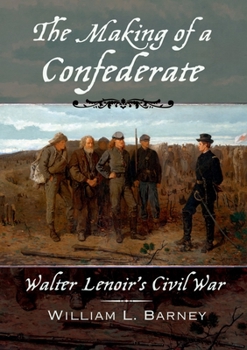The Making of a Confederate
Select Format
Select Condition 
Book Overview
Despite the advances of the civil rights movement, many white southerners cling to the faded glory of a romanticized Confederate past. In The Making of a Confederate, William L. Barney focuses on the life of one man, Walter Lenoir of North Carolina, to examine the origins of southern white
identity alongside its myriad ambiguities and complexities. Born into a wealthy slaveholding family, Lenoir abhorred the institution, opposed secession,...
Format:Hardcover
Language:English
ISBN:0195314352
ISBN13:9780195314359
Release Date:November 2007
Publisher:Academic
Length:272 Pages
Weight:0.75 lbs.
Dimensions:0.8" x 6.3" x 7.1"
Customer Reviews
4 ratings
A fine scholarly study of the causes of the Civil War and the development of one man's post-war Sout
Published by Thriftbooks.com User , 14 years ago
Examines the life of Walter W. Lenoir (1823-1890), "a slaveholding North Carolinian, who despite morally opposing slavery and preparing to move to the free state of Minnesota in 1860, enlisted in the Confederate Army and became a fervid Confederate." Carefully considers the context of his role in the War and his reaction to the South's defeat, including his "search for redemptive meaning" and the strategy that he and others adapted to cope with the bereavement and "crushing sense of loss" they felt at the War's end. The book serves as William L. Barney's response to the scholarly question of: "why did [Walter W. Lenoir] a politically conservative Southerner personally opposed to slavery who had decided to leave the slave South for the North commit himself heart and soul to the Confederacy when the Civil War broke out?" It is his response to this question that serves as the core theme of this book. A theme with which readers are treated to an examination of "the larger narrative of nineteenth-century Southern history" and "questions that historians and the public have raised about that narrative." Uses the biographical study of Walter Lenoir to discuss the formation of the "Southern white identity" he and others assumed from the idea of "...a South that could have been -- SHOULD have been..." It is this "clinging to a romanticized vision of a mythic Southern past" that enabled "...many Southern whites [to] continue to find meaning and purpose in their lives..." Contends that this sense of identity became "a faith that mythologized the 'Lost Cause' to reshape the history of the Civil war to one remembered as a war of self-defense of their land, constitutional freedoms and rights of self-government." Readers whose intellectual background of the Civil War consists simply of standard overviews of the War's principal causes and battles from a high school or college American History survey courses will find this book fascinating. Finally, we have a readable text that delves into the background and underlying issues of the Civil War through the eyes and mind of a Southerner whose views and positions are forcefully articulated. While the issue of slavery is addressed directly - as well it should -- readers will also have the rare opportunity to consider other factors. Indeed, one quickly realizes that the Civil War wasn't simply a war between the North and South, as what is often forgotten: citizens of many Southern States were fighting among themselves; that significant and vocal populations of white Unionists existed within many of these States; that, as the War progressed, there were growing bands of deserters who were tired and unhappy with the War conducting guerilla warfare in the hinterlands of the Confederacy; that there was considerable anger among Southern troops against slaveholders exempt from the draft due to the number of slaves they owned (and their wealth); that there were discussions of the brutal discipline that brought structure t
Superb and Subtle History
Published by Thriftbooks.com User , 16 years ago
I'm astonished that a previous reviewer attacked the book because the author does not approve of slave owning. He doesn't. Who does? Neither did the Lenoir family members, who did own slaves. William Barney carefully shows how Walter Lenoir himself hated to punish his slaves but did it anyway to set an example for the other slaves, and how Lenoir like many other Southerners of his time, despised slavery but depended on it. To him, it was evil but necessary. The war itself and its aftermath is what turned Lenoir into a confederate, and Barney traces that change in thought and attitude subtly in clear,enjoyable prose. The book is a beautiful portrait to a troubled and in many ways admirable man and his times.
Walter Lenior's Civil War
Published by Thriftbooks.com User , 16 years ago
This small book intelligently uses the letters and records of Walter Lenoir to explain the impact of the Civil War and its aftermath in the western mountains of North Carolina. It also illustrates that support for slavery and secession wasn't universal even among slave-owning elites such as Lenoir, but that Lincoln's call for troops drove Lenoir and others like him into the position of defending their state and the South, while their experiences of the war itself made them confederates thereafter. The author's own values can sometimes intrude too much, but that aside this is a well-written and insightful biography. If, like me, you are interested in the civil war's impact on the southern population and/or interested in western North Carolina, you will enjoy this easy-to-read book
The Making of a Confederate Walter Lenoir's Civil War
Published by Thriftbooks.com User , 17 years ago
I really enjoyed this book.Although it teaches us much about history, it is well written and reads like a novel. I must admit that Walter Lenoir is an ancestor of mine but I still highly recommend this book to anyone who enjoys learning and reading about the Civil war. It is a EXCELLENT book!!! Kudos to the author.





